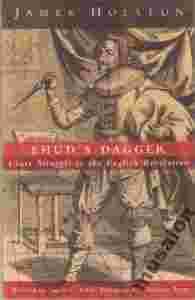|
James Holstun
Ehud's Dagger
Class Struggle in English Revolution
London 2002
Stron XIX+460, format: 14x23 cm
Contents
PREFACE: Apology, Summary, and Thanks ix
PART ONE: HIERARCHY AND ASSOCIATION 1
1 Cornet Joyce's Commission 3
2 Historical Revisionism and the Perils of Chronism 9
Introduction 9
Con: A Prioris, Opposition, and Whiggery 11
Pro: Multiple Kingdoms, Religion, and Personalities 28
Revisionism as New Conservatism 42
3 Foucault, the New Historicism, and the Base Curiosity of the Plebs 46
Damiens's Remonstrance 47
Genealogy and Power 50
Structure and Subject 61
Change, Containment, and Subversion 69
Post-revisionism and Its Prospects 76
4 Class Struggle and the English Revolution 85
The Usual Suspects 85
Base, Superstructure, and Hierarchies of Determination 90
Status and Class 96
Class Consciousness and the Public Sphere 106
Original Theft and the Transition 112
Small Producers and the English Revolution 124
Early Modern Studies and the British Marxist Historians 136
PART TWO: RADICAL PROJECTS 141
5 The Deference of John Felton 143
Introduction 143
Good Clients Gone Bad: Patronage and Tyrannicide 146
Buck, King of Game 152
"God bless thee, little David!" 165
Felton at Colonus 177
Noble Felton Resolutions 186
6 New Model Soviets: The Agitators and Martial Praxis 192
Armed Prophets 192
Something New: The Emergence of the Agitators 196
"No Courtesy!": Consensus vs Conflict at Putney 218
Possessive Individualism and the Expense of Blood 231
Contingency and Martial Law at Corkbush Field 246
7 The Public Spiritedness of Anna Trapnel 257
Handmaids Discovered and Revealed 257
Fifth Monarchy Woman 267
God's Handmaid vs the Little Horn: The Prophecy at Whitehall 279
A Gazing Stock: Cornhell and Bridewell 289
Britomart II 297
8 Forlorn Hope: Edward Sexby and the Republic 305
Centrifugal Charisma 305
Strange Engines: Serial Conspiracy 308
Sardonic Ethics in Killing Noe Murder 327
Aftermath: Tyrannicide as Critique 352
9 The Diggers' Hortus Incondusus 367
Rational Hunger 367
Paternalist^, Improvers, and Fellow Creatures 377
Natural Law in Loco Parentis 389
Green Millennialism 397
Georgic Prophets and Pastoral Poets 411
Common Futures: The Diggers and the Forest People 421
INDEX 435
In this meticulously researched, award-winning book, James Holstun details seventeenth-century England's first capitalist revolution, and its first anti-capitalist revolutions, in a stirring project of Marxist history from below.
"This remarkable book offers both a passionate engagement with the concrete processes of political struggle in the English Revolution and a powerful
critique of current theoretical models in historiography and literary theory. Intellectually alive from start to finish, Holstun's book captures
the polemical energy of the early modern radicals he discusses." David Norbrook, Merton Chair of English Literature, Oxford University
"... thoroughly thought-provoking ..."
History: The Journal of the Historical Association
"Ehud's Dagger brings the events of the Civil War period and the ordinary people who made them to life."
Observer
"... an examination of radical projects which demonstrate the practical contribution of working people to the 1650s."
History Today
"Powerfully cogent, often brilliant in its stylistic sophistication, and magisterial in the range of its scholarship ... a work brimming with intelligence."
"... an intense, thoroughly researched new Marxist study of the English Revolution."
"As an antidote to the distortions of revisionism and as an expression of the continuing vitality of Marxist historiography, Ehud's Dagger is particularly welcome. Three cheers for it!"
Albion
"Holstun writes with a meticulous attention to historical detail, evoking the sense of peering into the past through a window in time ..."
Reviewer's Bookwatch
JAMES HOLSTUN is the author of Rational Millennium: Puritan Utopias of Seventeenth-Century England and America and the editor of Pamphlet Wars: Prose in the English Revolution. He teaches English at the State University of New York, Buffalo
|
|
 |
|
Księgarnia i antykwariat MUSAION oferuje publikacje nowe i używane o znacznym walorze poznawczym opierające się upływowi czasu znacznie dłużej niż w przypadku książek z nauk ścisłych czy przyrodniczych. Stąd też w ofercie, obok książek nowych, znajdują się np. wydania źródeł, leksykony, opracowania wydane kilka /niekiedy kilkanaście/ dekad temu wciąż wykorzystywane przez profesjonalistów.
Oferta obejmuje publikacje renomowanych wydawców przeznaczone dla wymagających klientów: miłośników sztuki, naukowców, studentów i profesjonalistów, stąd też dbałość o obecność wartościowych tytułów w katalogu. Dzięki kontaktom z wydawnictwami możliwe jest uzyskanie niższej ceny.
|
|
 |
|
Jeśli poszukiwanej książki nie ma aktualnie w ofercie, to możliwe jest jej sprowadzenie z niemal dowolnego kraju, nowej lub używanej, w dobrym lub bardzo dobrym stanie. Jeśli są Państwo zainteresowani, to należy wysłać zapytanie na e-mail: [zasłonięte]@musaion.pl i zamieścić w nim przynajmniej nazwisko autora, tytuł. Więcej informacji w zakładce "o mnie".
|
|
 |
|
Dokładne opisy książki zawierają spis treści oraz charakterystykę publikacji zaczerpniętą z obwoluty lub okładki i niemal eliminują ryzyko zakupu nieodpowiedniej książki. Wskazane są wszystkie defekty książek używanych, jeśli takie są. Do albumów z kolei dodawana jest galeria zdjęć. Dalsze informacje, w tym także o składaniu reklamacji, znajdują się w zakładce "o mnie".
|
|
 |
|
Realizacja zamówienia rozpocznie się po odnotowaniu płatności „Płacę z Allegro” lub tradycyjnego przelewu. W przypadku niektórych banków może trwać jeden-dwa dni robocze. Przelew dokonany w urzędzie pocztowym ma wydłużony czas realizacji.
Możliwa jest także płatność przy odbiorze /za zaliczeniem pocztowym/ - prosimy o kontakt.
Do książek dołączany jest paragon fiskalny lub faktura [prosimy o tej preferencji poinformować]. Koszty wysyłki, taryfy w zakładce "o mnie".
|
|
 |

